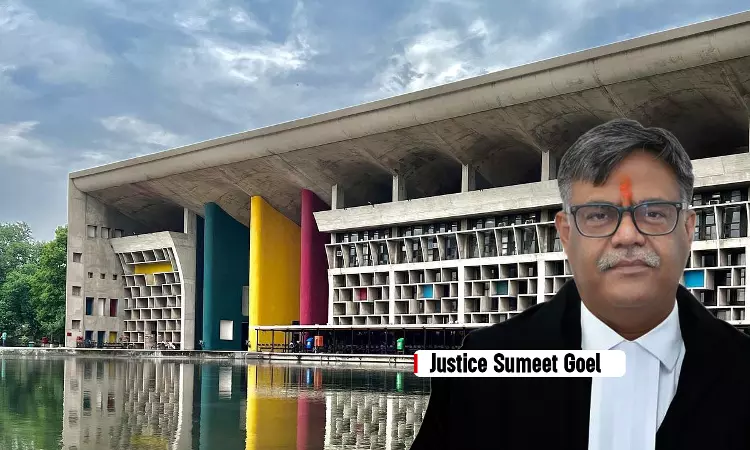- Home
- /
- High Courts
- /
- Punjab and Haryana High Court
- /
- Courts Must Consider Social...
Courts Must Consider Social Realities, Adopt Pragmatic Approach When Considering Accused's Plea To Travel Abroad: P&H High Court
LIVELAW NEWS NETWORK
30 Oct 2025 9:10 PM IST
Observing that "courts must not remain in an 'ivory tower', but must engage with and adjudicate in consonance with evolving social realities", the Punjab & Haryana High Court has said that Courts must take a pragmatic approach in considering an accused's plea to travel abroad.Justice Sumeet Goel said, “When seized of an application by an accused entreating for permission to travel...
Observing that "courts must not remain in an 'ivory tower', but must engage with and adjudicate in consonance with evolving social realities", the Punjab & Haryana High Court has said that Courts must take a pragmatic approach in considering an accused's plea to travel abroad.
Justice Sumeet Goel said, “When seized of an application by an accused entreating for permission to travel abroad, the Court's deliberation must be moored in this modern socio-legal context. The right to travel abroad has, through the efflux of time and the exigencies of modern life, become so profoundly entrenched and inextricably interwoven with the daily affairs of an individual that it is now an indispensable facet and an ineluctable corollary of the fundamental right to life & liberty, as Article 21 of the Constitution.”
The Court however, clarified that, it is axiomatic that no right, even one of such constitutional gravitas, is sans limitations or absolute.
"The right of an individual to travel abroad is not an unbridled license and is amenable to curtailment under the aegis of judicial scrutiny. It is for the Court to effectuate a delicate and judicial balancing act. This equilibrium must be maintained between the fundamental right of the undertrial/accused to pursue his legitimate affairs, both personal and professional & the collective interests of the society and the prosecution to ensure the unwavering presence of the accused before the trial Court, thereby preventing a fait accompli where justice is, frustrated," it added.
'Likely' Implies Reasonable Probability, Not Mere Possibility
The bench said that the objection is raised that the accused possesses a flight risk. In support of such objection, the ground raised is that it is likely that such an applicant may flee from the process of justice and never ever return to India.
It explained that the term 'likely' by its inherent semantic nature eludes any singular, precise or universally applicable definition.
"This term demands a nuanced and careful interpretation. It is imperative that 'likely' be construed as denoting a reasonable probability or a palpable probability rather than a mere nascent possibility or a speculative probability. This distinction is crucial because assessing the 'likelihood of fleeing' necessitates a predictive judgment concerning future conduct—an inherently complex and often indeterminate task upon which no conclusive adjudication can be made with absolute certainty," the single-judge added.
Chance Of Trial Being Delayed Cannot Be Grounds For Denial
Justice Goel further explained that the plea often raised by the prosecution is that the trial would procrastinate in case the applicant-accused is permitted to travel abroad. It opined that the chances of trial being delayed, by itself, cannot be a ground sufficient to decline any permission to an accused to travel abroad. Indubitably, this concern does remain a pertinent factor to be considered but the same would depend upon factual milieu of a particular case.
"Remedial measures/ steps can be taken, including but not limited to, seeking an affidavit of the applicant-accused that trial proceedings (including recording of evidence) may go on in his absence but in presence of his counsel and he shall remain bound by such proceedings including recording of evidence," it added.
The bench further said, " To similar effect would be the situation wherein the criminal proceedings are at the stage of investigation and final report has not been filed/presented—in such a situation as well, the interest of the prosecution can well be secured and the fear(s) expressed can be allayed by taking a similar undertaking from the accused.
Globalization and Seamless Interconnectedness Have Made International Travel A Necessity, Not Rare Privilege
The Court further observed that the contemporary world, characterized by an accelerating pace of globalization and seamless interconnectedness, has rendered international travel a quotidian necessity rather than a rarefied privilege.
This paradigm shift necessitates that the Courts must not remain in vacuo or ensconced in an 'ivory tower', but rather must engage with and adjudicate in consonance with evolving social realities, adopting a pragmatic approach, it added.
The Court concluded that cases must be considered on their individual merits.
It opined that factors like gravity of allegations, the accused person's antecedents and roots, the bona fides of the purpose and duration of travel and the accused person's willingness to furnish security to ensure repatriation can be taken into account.
These observations were made while hearing a plea of an accused challenging the trial court's refusal to allow him to travel abroad. Considering that he was earlier permitted to travel abroad and that the case is pending since 2018, the Court allowed the plea seeking permission to travel abroad.
Mr. Namit Khurana, Advocate for the petitioner.
Mr. Tarun Aggarwal, Additional Advocate General, Haryana.
Mr. Abhijeet Chaudhary, Advocate for the complainant.
Title: Jonty Chhag @ Jonty Vinay Chhag v. State of Haryana
Title: Jonty Chhag @ Jonty Vinay Chhag v. State of Haryana
Citation: 2025 LiveLaw (PH) 418



